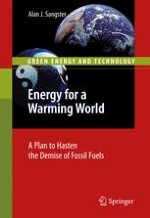"Energy for a Warming World" challenges the commonplace notion that the amount of power which mankind can potentially harness from renewable resources is more than large enough to assuage future demand levels.
By examining the renewable issue from an electrical engineering perspective, and exercising due regard for the limited capability of current and future electrical generation and transmission systems, this book attempts to provide more realistic statistics for the levels of power which could be extracted from sustainable resources in the critical time frame of 30 to 40 years. The engineering logic leads inexorably to the importance of taking a global outlook on the switch to renewable power supply and transmission – an outlook which has some surprising and uncomfortable ramifications for mankind.
"Energy for a Warming World" provides a new perspective on renewable resources for academics and researchers in environmental or electrical power engineering, as well as to students in related areas.
